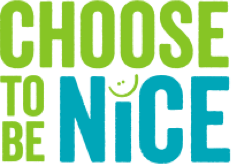 When I tell people the name of our organization, people generally focus on that last word, “nice.” It resonates with them. We love when people are nice to us. And we like how people respond when we’re nice to them.
When I tell people the name of our organization, people generally focus on that last word, “nice.” It resonates with them. We love when people are nice to us. And we like how people respond when we’re nice to them.
But, there’s a reason that our name isn’t simply “Be Nice.” That is shorter, and it is sweet, but it doesn’t really get to the point. There’s more. For me, the word I like to focus on is the first one, “choose.”
We have many choices every single day about how we treat others with whom we come into contact. How many interactions with others have you had today before reading this? A dozen? Two dozen? More? Every day, we encounter and interact with a lot of people. Some of them we know and love, or at least like quite a bit. But most of them are likely acquaintances or people we’ve never met or barely know. And yet, we have the power to affect them regardless of how well we know them or how much we care about them just by the way we treat them, respond to them and react to them at a moment in time.
Suppose you bump into a person as you’re rushing into the grocery store. Maybe it was their fault for being “in your way”. Maybe you weren’t paying attention to your surroundings. Does it matter whose fault it is? I think what really matters is how we choose to respond next. You can ignore it, roll your eyes and move on feeling disgruntled about the crowds. You can admonish the person for being unaware of others. You can say you’re sorry and ask if that person is okay.
We have these interactions all day long and yet we often don’t think about our options. We typically just respond and/or react at the moment and that response or reaction may not be the one we would make if we stopped for a second and thought about the consequences. Throw a pebble in the pond and watch the ripples.
 Take that encounter in the grocery store. You say you’re sorry. That person appreciates being acknowledged and respected. That person helps another shopper reach some items on a high shelf. That shopper feels happier and smiles at the cashier and says “thank you” on the way out. The cashier feels better about his job, so he works a little harder and earns a promotion. And on and on it goes, one small act after another, each with the power to make the world better or worse.
Take that encounter in the grocery store. You say you’re sorry. That person appreciates being acknowledged and respected. That person helps another shopper reach some items on a high shelf. That shopper feels happier and smiles at the cashier and says “thank you” on the way out. The cashier feels better about his job, so he works a little harder and earns a promotion. And on and on it goes, one small act after another, each with the power to make the world better or worse.
It’s not about doing specific acts of kindness. Those are certainly important and should be encouraged. It’s always great to think proactively about what we can do to improve the lives of others. But I’m thinking about something broader. It’s about how we live our lives day in and day out. It’s about living our lives based on a set of values that provides benefits to us and to others. These are the nine values that form the core of our school programs: respect, kindness, acceptance, teamwork, honesty, responsibility, friendship, patience
When we talk about Choose To Be Nice, we’re talking about creating a lasting culture of kindness. This is not a day or a week of good deeds. Those are just as important as the specific acts of kindness and can help bring a
I want to encourage us all to make a fundamental shift in our perspective. I want us to be more aware of the endless amount of opportunities we have every single day to make better choices about how we interact with one another. Let’s work to make our interactions with others more meaningful, more kind, more thoughtful, more respectful. That is how we truly make a difference.
